 |
| Bruno Dumont, the director of The Empire with Anne-Katrin Titze on fairy tales: “You know the Queen and Fabrice Luchini's character certainly come from that imaginary world of the marvelous.” |
In Bruno Dumont’s ingenious The Empire (L’Empire, Silver Bear Jury Prize winner at the 74th Berlin International Film Festival), starring Fabrice Luchini as Belzébuth (clad in Emil Jannings’ skullcap straight out of FW Murnau’s Faust) and Camille Cottin as The Queen, the forces of Good and Evil, aka the Ones and the Zeros, descend or, respectively, ascend on a small coastal village in Northern France to take over humans and fight their larger-than-earth battles. The reason is 'the Wain,' a demon child born there to unleash unheard-of destructive forces if not stopped. Freddie (cast with a perfectly sunny little baby) not coincidentally shares his name with the protagonist of Dumont’s very first feature film, The Life Of Jesus. As on a Möbius strip, opposites intertwine in this realistic comic space opera tragedy fable about the ideal and the ordinary, the bombastic and the quotidian.
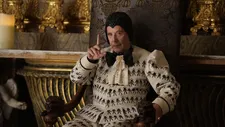 |
| Bruno Dumont on Fabrice Luchini as Belzébuth in The Empire: “There's this coexistence of the tragic and the comedic, and one finds the representation of that in his costume …” |
We first encounter Jony (Brandon Vlieghe), father to the Wain, on his fishing boat whose markings include 666, a clear, albeit initially only sign that he is part of the dark side. Jane (Anamaria Vartolomei), who emerges from the sea like a Bond girl mermaid warrior struggles with the newly discovered desire a human body contains. She works with The Queen who, for practical reasons, took over the form of the local mayor, (while Belzébuth picked a bucket- hatted tour guide). A lot is going on here in this melange of genres where lightsaber fights have the hallmarks of child’s play and a car drops casually from the sky. Spectacular spacecrafts designed in correspondence with historical feats of architecture land on leftover Nazi bunker ruins along the shore and the black hole ready to devour all resembles a washing machine.
The Queen finds humans so “endearing and amusing” and she hasn’t even yet met the local gendarmes Commandant Van der Weyden (Bernard Pruvost) and Lieutenant Carpentier (Philippe Jore), two mainstays from the Dumont universe, where saints float, cannibals live next door and wind blows gently over the dunes. “Evil grows where Good recedes,” we hear, but as one is born out of the other and humans are involved, things remain complicated.
From France, Bruno Dumont joined me on Zoom for an in-depth conversation.
Anne-Katrin Titze: I think this is the fifth film of yours that we are talking about!
Bruno Dumont: Well, it's a pleasure. Bravo!
AKT: And The Empire feels at the same time very familiar and very new. When we spoke about your film France you mentioned that you were planning to do something in outer space. And so I want to start by asking: How does a film like this begin? Is it the structure in your head? Is it the desire to build spaceships out of architectural history? Is it expanding the theme of good and evil? Or is it what Billy Wilder said: I always want to make the opposite of what I've just done?
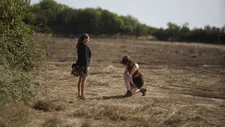 |
| The Queen (Camille Cottin) with Jane (Anamaria Vartolomei) |
BD: Well, from the beginning I've made natural cinema. I take on natural questions with the inconveniences and advantages that can have. The advantages are probably truth, reality, strength, and the inconveniences are a kind of chiaroscuro that human notions, such as good and evil, are never entirely clear. For instance, when I made my film Life of Jesus, my first feature, good and evil were not easy values to identify, to deal with. So I looked to genre, this genre, to deal with these values in a way that was very clear with characters who embodied good or evil.
So, for example, Jane is someone who is a Wonder Woman, it can really be seen what she is. I wanted to confront heroes like this one, like these heroes from mythology, heroes from fantasy with my characters who are anti-heroes, where good or evil are much more difficult to identify. What I wanted to do is to confront two cinematic genres and bring them together. For instance, the love that Jony feels for Jane is truly the subject of the film. She's a character who has descended from the heavens and is full of these values and is confronted with the chiaroscuro of natural life. I wanted to confront these two worlds, confront the space opera with my characters who are played by non-professionals and very professional people. That was the starting point.
AKT: You bring up your first film, Life of Jesus. Of course, anybody who has seen that and seen the latest one can connect Freddie, the name of the baby to being the name of the protagonist in the earlier film. So the juxtaposition of opposites also refers to a before and after. Also there are the opposites of up and down, there's outer space and there's underwater, the bombastic and the quotidian. Opposites are everywhere in the film, and how you bring them together is fascinating. Could you talk a little bit more about how you were maneuvering these opposites, how they clash? Is it like a Möbius strip or a Mise en abyme?
 |
| Jane (Anamaria Vartolomei) with Rudy (Julien Manier) looking up at the sky |
BD: What you say is absolutely right. What I'm interested in is the present and the real, the real as it is. I’m interested in the origin of what we are. Why are we how we are? I'm interested in all the contradictions and the opposite things that go in to making us. Why do we have this capacity to do great things and to be absolute bastards? Through literature and cinema one can find the origin of these forces that make us who we are. So why, for instance, is Freddie a bad person? Why is this guy evil?
I find that fascinating and cinema offers us the opportunity to find the origin of Freddie in Faust. So little Freddie is a bad guy. He's a racist. If you dig a little bit you find these extraordinary mythological figures of evil. That's what evil is. It is the most horrible, apocalyptic, imaginary representations. And that leads us back to the individual. I'm interested in having this collision of the profane of the small things that we do on a quotidian basis and this cataclysmic level.
I use film to find that. Why is Freddie evil? Freddie is evil because he is the son of Mephistopheles. You know everything in literature and film is connected that way, and I find that absolutely fascinating. When everything is united in this way, it gives us possibilities to tell extraordinary stories that explain our ordinary lives.
AKT: Cinema is perfect in that respect. You mention Faust and Mephistopheles. You took the cap for Fabrice Luchini, didn’t you? He's wearing Emil Jannings’ cap. And then his suit has a pattern that one could almost see on a onesie. He’s at the same time evil incarnate and has something of a little baby in his performance. Please tell me about choosing Luchini for this role! You already had him cast in Slack Bay, where he was also wonderful. Did you see evil and the baby in Luchini?
 |
| Line (Lyna Khoudri) looking at her phone |
BD: Yes, I think if you go back to the origin of these forces, it is like this. The origin of evil is good, the origin of good is evil. The origin of the tragic is the comic, and vice versa. I'm talking about common sources. So Fabrice Luchini is a good example, because, on the one hand, he's tragic. He is really pure evil, and yet he's also comic. He's ridiculous. There's this coexistence of the tragic and the comedic, and one finds the representation of that in his costume, which is a theater costume which exaggerates the theatricality of the character.
And so there's also something that's close to comedy in him. You know, it's both Mephistopheles and a buffoon. What I'm interested in is the coexistence of these values, and that's why the choice of Fabrice Luchini interests me so much because he's an actor who's both serious and not serious. He can be working in both registers on both levels, and not even realise it. He would prefer to be serious. The problem for him is that even when he's serious he's funny.
AKT: It is also funny how evil finds his body in the shape of a tour guide at the seaside! Children learn the difference between good and evil from fairy tales, or at least they used to, maybe not anymore. One person is all good, the other is all evil. And only later the grey areas come in. I felt you have a number of these fairy-tale tropes mingled in the film. At times I was reminded of The Wizard Of Oz. There are scenes that resemble the fairy-tale films of Jean Cocteau or Jacques Demy [and Hayao Miyazaki’s Howl’s Moving Castle]. Did that cinema of the magical, of fairy tales also somewhere come in?
BD: Yes, it's true. There's something in the fantastic genre that's close to the fairy tale. Magic is not far from the characters that I'm using here. You know the Queen and Fabrice Luchini's character certainly come from that imaginary world of the marvelous. The film The Empire makes genres circulate among themselves. So in that sense, what you've said is a very accurate remark, because there's so much circulating in the film. The genres come up against each other. And so to pass from fantasy to the natural, for instance, one must go through certain sub genres, such as the fairy tale for children.
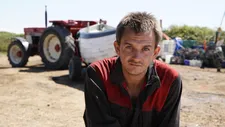 |
| Jony (Brandon Vlieghe) |
The Queen is a way of representing something for children in a gentle way that is hard to understand. And what is interesting for me in these genres is that they are pedagogical. There's something about them that is so crystal clear and yet not real. They're nearly caricatures. And that's the problem with these representations. It is that they're very edifying, but they don't correspond with reality. And I think that's why I always return to the natural, because the natural is not night and day. There's something a little bit unclear about it with these genres. When you're working for kids, it's not real.
It's the Big Bad Wolf, the Little Red Riding Hood. These are stories for children to learn to be initiated, and for children they need to be a little bit gentler. So you were right when you were talking about Fabrice Luchini earlier, and saying that there's something of the child about him. He's bad, but he's not all bad. There's something about that gentle universe that we create to prepare children to be adults in him. And so in that sense, the film is a mix of these different things, and your remark is a very accurate one. The film even has a little bit of a cartoon aspect.
AKT: I loved your spaceships. They are wonderful creations. The architecture from Versailles and the Sainte-Chapelle to the Caserta Palace to the Palace of Belém and how you combine them all in new ways. Did you have fun constructing them?
BD: Well, the technicians who were supposed to build these spaceships for me had a lot of trouble because they kept offering me the spaceships that you see in every film. So it was very hard for me to lead them to get rid of the cliches and make new space vessels that brought in these big vessels of culture. Like the Sainte-Chapelle. The idea was to try to recreate a new imaginary world or landscape, because the genre of the space opera is a very repetitive one, you know, it's hard to invent new things. And so I enjoyed searching and trying to compose something that belonged to this genre, but featured original spaceships that I found very interesting to do.
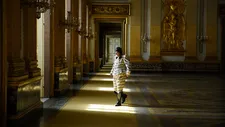 |
| Belzébuth (Fabrice Luchini) |
AKT: They are beautifully new. And sometimes the architecture turns into weapons, and suddenly the black hole looks like a washing machine. So you very much succeeded. There's often one sentence in your films that strikes me as particularly pointing to the core. In Slack Bay it was “We know what to do, but we do not do.” Maybe also because of the times we live in, I was struck when Lucifer, Belzébuth comments about the good side: “They are so predictable and rigid.”
BD: Yes, I try not to intellectualise, but since there's dialogue, you will always find sentences that are like these statements that express the spirit of what is going on. I try to avoid these intellectual sentences. I try not to follow that path. It's like what we were saying earlier about kids and the world of the marvellous. I also make cinema in that way, trying to touch things that are deep inside us, but that are contradictory. I like to know, I like to try to go deep into humans to understand who we are. There was this sentence that Joan of Arc says, Men are how they are, but we must think about how we should be. I think that's right. I make films to show people as they are and not worry about how they should be.
I'm not interested in moralising. I'm interested in nature in showing this is who we are. This is what we're like, you know. Jony is a good kid, but he also has flaws. I like to not be a moraliser and to not show how things should be. It's what little Joan said. People are like this, and we should think about how we should be. Maybe some people don't like that. But I think we need to start from human nature to build a better world. Telling us how a better world should be, there's no point to that. We need to start from nature.
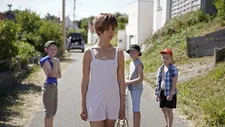 |
| Line (Lyna Khoudri) passing three little boys |
I think it's better for viewers to see themselves as they are than to listen to a bunch of moralising. At least, that's how I do things. That's why Jane is very interesting. The fact that she's a heroine, that she's an angel of good, that's much less interesting than her torment over being a woman, a human. The torment she has about feeling desire. That's what interests me is Jane's humanity. The fact that she's a superwoman doesn't interest me in the least.
AKT: As much as I love all the original spaceships that you constructed, I think my favourite moment is when two of your characters are playing with their lightsabers. The location is this completely normal village life where there's a little house, and there's a road, and they are playing at good and evil space opera with their lightsabers. The same way so many children do all over the world every day. Kids copying cinema, since it exists, playing Robin Hood, Tarzan, whatever. And you double this in an interesting way by showing a scene of them copying cinema and by putting it into your cinema, showing in a very simple effective way how intertwined with the real it is.
BD: Absolutely. That's why we read books. That's why there are myths. That's why there are extraordinary tales. It is so. We can stand tall in reality.
AKT: What is coming up? Where are you leading us next?
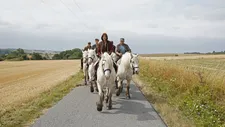 |
| Jony (Brandon Vlieghe) leading the pack |
BD: I'd like to make a film with children, really young children, to come close to childhood to see what it's like, and for us adults to remind ourselves how we were as children.
AKT: That makes perfect sense, see you next time! Thank you so much.
BD: My pleasure, thank you! Bye-bye!
The Empire opens at the IFC Center on Friday, March 7.
























